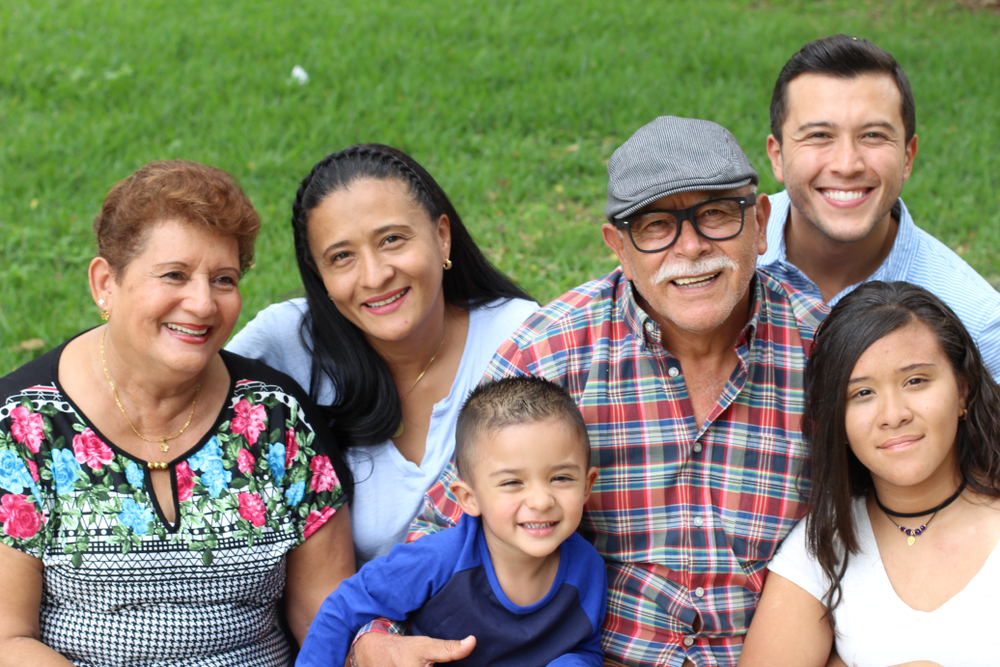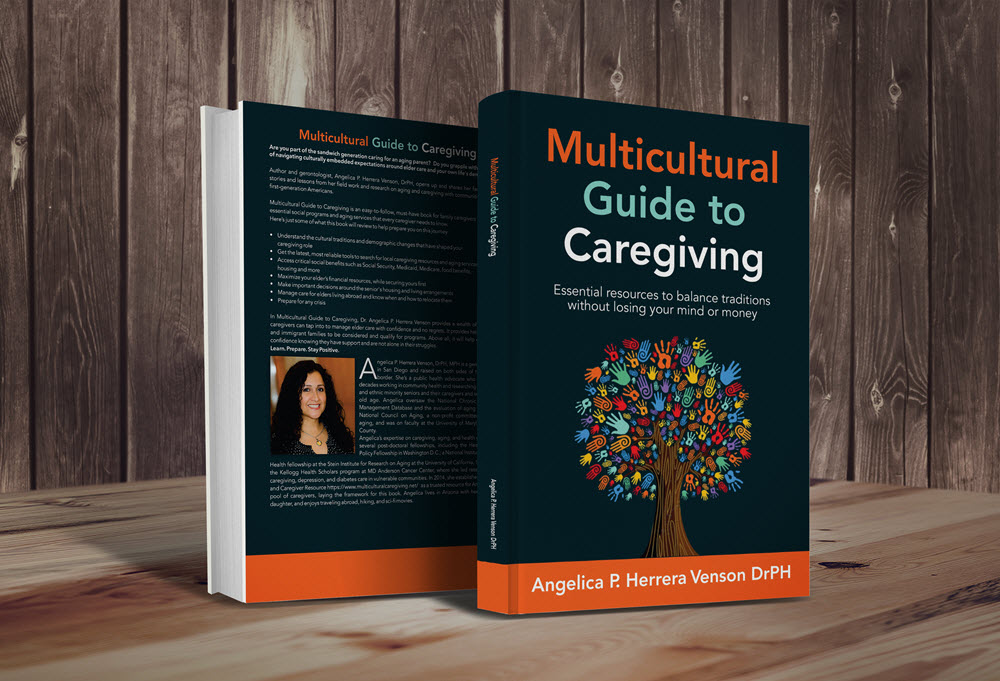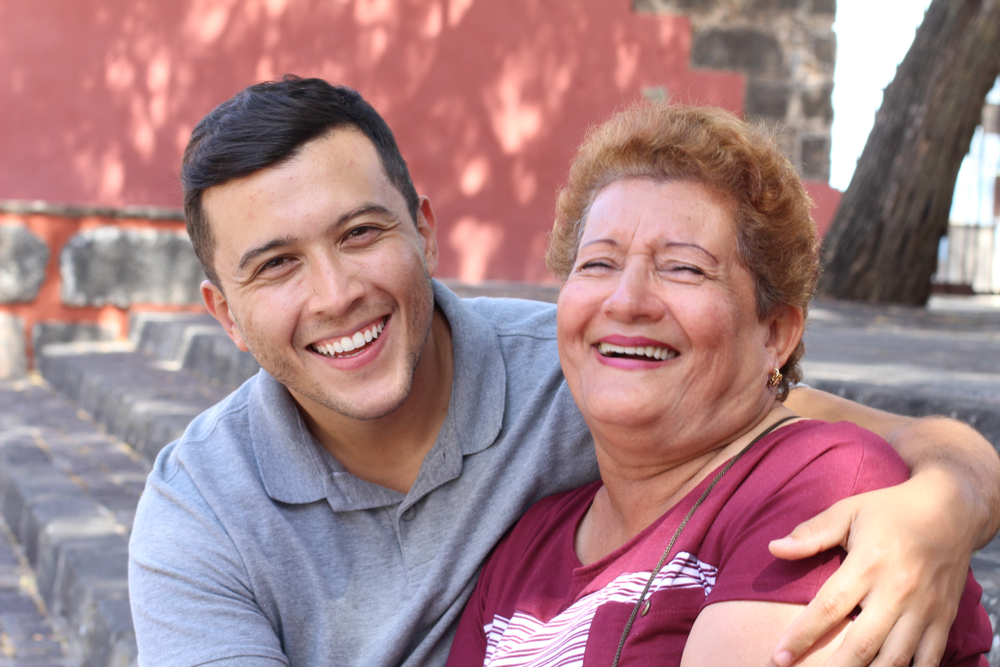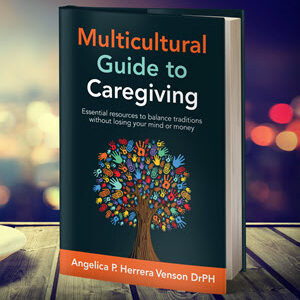
Hispanic culture is well known for its focus on family values, especially care for the elderly and young. Hispanic family culture typically perceives caregiving for elderly relatives as a duty and would be ashamed to be unable to care for them.
It’s not a burden, it’s a joy to incorporate the elderly into one’s family, where all benefit from the wisdom and experience older relatives offer to multigenerational families.
Challenges That Hispanic Families Face
While caregiving has many positive features and gives families a way to give back to seniors, the role comes with its challenges too. It’s what motivated me to write Multicultural Guide to Caregiving, a book that brings together the best resources for aging care for Hispanic /Latino families.
In it, I walk you through how figure out how you’ll pay for senior care, access important benefits and social services, even when you’re caring from a distance. This advice comes from my decades of research with Latino and minority family caregivers as a gerontologist and personal family experiences.

Stress on the Family
Although Hispanic family culture prioritizes caregiving, the act of caring for elderly relatives can still be incredibly stressful.
Patriarchal Hispanic culture also dictates that female family members, typically mothers, are expected to care for elderly parents, sapping their energy, time and resources in the process. Almost 75% of caregivers are female and tend to be in their 40’s, caring for relatives in their mid-60’s.
Husbands and children can feel neglected and resentful because of this. And then there’s the mother herself who is required to care for the entire family, including her or her husband’s parents, and sometimes even work part- or full-time.
The elderly themselves feel the stress of the situation when circumstances require them to take a back seat to the needs of other family members, and no longer retain the same levels of authority they used to have.
As such, despite a strong culture of care, Hispanic families can experience significant levels of stress when including the elderly in their home.
Hispanic families do also experience higher rates of unemployment, poverty, and incarceration than whites, all of which further strains the family’s ability to care for the young and the elderly.
Reducing Stress on the Family
Despite the stress of caring for the elderly, Hispanic families do reap benefits from integrating elderly family members.
The elderly are frequently capable of caring for the family’s children, a valuable service for working parents. Childcare is expensive and this service saves families money.
Having the elderly at home enables both parents to work, another financial benefit. Oftentimes grandparents cook, clean and perform other household functions that save everyone else time and money.
They also contribute emotional support, an undervalued asset of multigenerational families. Parents of young children can rely on the wisdom and counsel of their parents.
Health Complications

Perhaps the greatest strains the elderly can place on their family are the health problems they are likely to encounter along the way.
Conditions like dementia, stroke, heart disease, diabetes and arthritis all place significant hardship on families already strained from an extra family member in the home. These require extensive pain and medication management, along with coordination of multiple specialists.
Many Hispanics work physically demanding jobs like dishwashing, gardening, farm labor, factory food processing and other forms of manual work that is tough on their backs, joints, hands, eyes, and nerves. As workers grow older, work-related health problems become chronic conditions.
Jobs that cause so many health problems very rarely offer health care, making it difficult to receive care outside of the Emergency Room.
In cases where the elder relative is undocumented, they do not qualify for programs like Medicare and Social Security, social safety net programs that alleviate much of the financial strain and afford important health care benefits.
Language Barriers
It’s tough to learn a new language, especially one as complex as English. Undocumented Hispanics find it difficult to enroll in language courses due to citizenship requirements for many schools.
Without English skills, it may also be difficult to access other social services like medical and health clinics. Language barriers can prevent Hispanics from accessing many jobs and further education.
Elderly grandparents may also be confused by a bilingual atmosphere in the home. Grandchildren usually grow up bilingual, speaking Spanish at home and English outside of it.
It can be disempowering when a child is required to translate for an adult in the family during a health care visit. Yet it is not uncommon for children to serve as translators, even in important matters of health, business, finance and education.
Tradition & Culture
Hispanic family culture traditionally cultivates a culture of respect for one’s elders. This culture dictates that it is the duty of Hispanic families to care for family members who can no longer care for themselves.
Hispanic faith communities, typically Catholic although increasingly Evangelical Christian, traditionally provide members of the community with additional supports in times of need. Some Hispanics rely on faith communities and family assistance, while regarding institutional caregiving with suspicion.
Further help is needed to help families feel comfortable in using the services of health care professionals as an additional layer of support for their family’s needs.
Rewarding & Exhausting
Providing care for elderly relatives can be rewarding and exhausting in equal measure, but will only work when there is sufficient understanding and support both within the extended family and community.
Providing bilingual information to Hispanic families is critical to assisting caregivers in Hispanic communities.
Most important of all for caregivers is the ability to recognize whether or not they are coping and to ask for help before they become so overburdened that they are unable to handle the strain any longer.
Early intervention can prop up families who are struggling, ensuring that they have the correct support and care available to them at critical times.


Leave a Reply